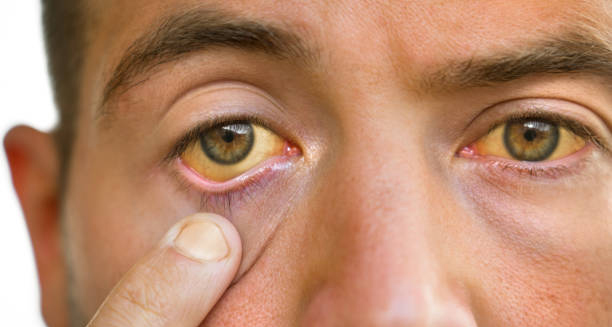Symptoms of Cirrhosis
Symptoms of cirrhosis vary depending on the stage of liver damage. Many people with early-stage cirrhosis do not experience any symptoms, which is why the disease often goes undiagnosed until significant damage has occurred. As the liver loses its ability to function properly, signs and complications become more evident.
1. Fatigue and Weakness
One of the earliest and most common symptoms, fatigue may result from reduced metabolism, toxin buildup, and nutrient deficiencies. It can severely affect daily functioning.
2. Jaundice | Symptoms of Cirrhosis
Yellowing of the skin and eyes occurs when bilirubin — a substance normally processed by the liver — builds up in the body. This is a classic sign of declining liver function.
3. Ascites and Swelling
Cirrhosis can lead to fluid accumulation in the abdomen (ascites) and legs (oedema). This results from a combination of portal hypertension and reduced protein production.
4. Easy Bruising and Bleeding
The liver plays a key role in making blood clotting proteins. With impaired function, minor injuries can lead to prolonged bleeding or spontaneous bruising.
5. Digestive Issues and Weight Loss
Reduced bile production and poor nutrient absorption cause bloating, indigestion, nausea, and weight loss. Patients may lose their appetite or feel full after eating small meals.
6. Mental Confusion | Symptoms of Cirrhosis
Hepatic encephalopathy results from the liver’s inability to filter toxins like ammonia. Symptoms include confusion, forgetfulness, mood changes, and in severe cases, coma.
7. Spider Veins and Skin Changes
Dilated blood vessels (spider angiomas), redness of the palms (palmar erythema), and itchy skin are common skin-related signs of cirrhosis.
8. Hormonal Imbalance
Men may experience reduced libido, testicular shrinkage, or breast enlargement due to altered hormone metabolism. Women may experience menstrual irregularities.
Identifying symptoms of cirrhosis early can significantly improve the chances of effective management. Any ongoing fatigue, swelling, or yellowing of the eyes warrants immediate medical investigation.
[Next: Diagnosis of Cirrhosis →]


